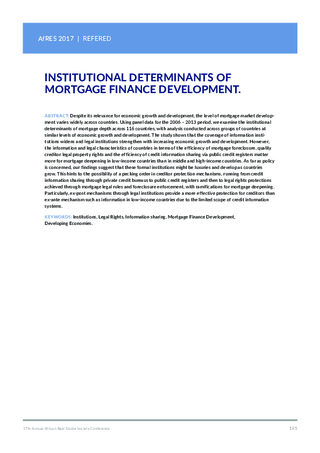Despite its relevance for economic growth and development, the level of mortgage market development varies widely across countries. Using panel data for the 2006 – 2013 period, we examine the institutional determinants of mortgage depth across 116 countries, with analysis conducted across groups of countries at similar levels of economic growth and development. The study shows that the coverage of information institutions widens and legal institutions strengthen with increasing economic growth and development. However, the information and legal characteristics of countries in terms of the efficiency of mortgage foreclosure, quality creditor legal property rights and the efficiency of credit information sharing via public credit registers matter more for mortgage deepening in low-income countries than in middle and high-income countries. As far as policy is concerned, our findings suggest that these formal institutions might be luxuries and develop as countries grow. This hints to the possibility of a pecking order in creditor protection mechanisms, running from credit information sharing through private credit bureaus to public credit registers and then to legal rights protections achieved through mortgage legal rules and foreclosure enforcement, with ramifications for mortgage deepening. Particularly, ex-post mechanisms through legal institutions provide a more effective protection for creditors than ex-ante mechanism such as information in low-income countries due to the limited scope of credit information systems.
Ball, M., K.A. Donkor-Hyiaman, and G. Marcato. "INSTITUTIONAL DETERMINANTS OF MORTGAGE FINANCE DEVELOPMENT." In 17th Annual African Real Estate Society Conference, 165-199. AfRES. Johannesburg, South Africa: African Real Estate Society, 2017.
Keywords: Mortgage, Legal Rights, Institutions, Information sharing, Finance, Development and Developing Economies
Refereed Designation: Refereed
